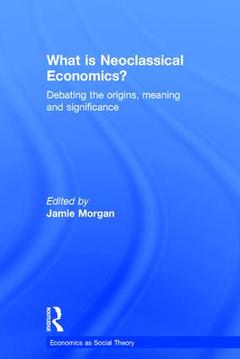What is Neoclassical Economics? Debating the origins, meaning and significance Economics as Social Theory Series
Coordonnateur : Morgan Jamie

Despite some diversification modern economics still attracts a great deal of criticism. This is largely due to highly unrealistic assumptions underpinning economic theory, explanatory failure, poor policy framing, and a dubious focus on prediction. Many argue that flaws continue to owe much of their shortcomings to neoclassical economics. As a result, what we mean by neoclassical economics remains a significant issue. This collection addresses the issue from a new perspective, taking as its point of departure Tony Lawson?s essay ?What is this ?school? called neoclassical economics??.
Few terms are as controversial for pluralist and heterodox economists as neoclassical economics. This controversy has many aspects because the term itself has different specifications and connotations. Within this multiplicity what we mean by neoclassical matters to pluralist and heterodox economists for two primary reasons. First, because it informs how we view and critique the mainstream; second, because the relationship between heterodox and mainstream economics influences how heterodox economists model, apply methods and construct theory. The chapters in this collection each have different things to say about these matters, with contributions ranging across the work of key thinkers, such as Thorstein Veblen and Kenneth Arrow, applied issues of non-linear modelling of dynamic systems, and key events in the history of economics.
This book will be of use to those interested in methodology, political economy, heterodoxy, and the history of economic thought.
1. What is this school called neoclassical economics? 2. From neoclassical theory to mainstream modelling: fifty years of moral hazard in perspective 3. Neo-classicism, critical realism and the Cambridge methodological tradition 4. Lawson, Veblen and Marshall: How to read modern Neoclassicalism 5. Lawson on Veblen on social ontology 6. Why is this school called neoclassical economics? Classicism and neoclassicism in historical context 7. Ten Propositions on ‘Neoclassical’ Economics 8. Neoclassical Economics: An Elephant is not a Chimera But is a Chimera Real? 9. The State of Nature and Natural States – ideology and formalism in the critique of neoclassical economics 10. Heterodox economics, social ontology, and the use of mathematics 11. Is Neoclassical Economics mathematical? Is there a non-Neoclassical mathematical economics? 12. Neoclacissism forever 13. Reflections upon Neoclassical Labour Economics
Jamie Morgan is Reader at the School of Accounting, Finance and Economics, Leeds Beckett University, UK.
Date de parution : 12-2015
15.6x23.4 cm
Date de parution : 11-2015
15.6x23.4 cm
Thème de What is Neoclassical Economics? :
Mots-clés :
heterodox; mainstream; open; systems; ontology; event; regularities; social; term; neoclassicism; Punch Drunk; Real World Labour Market; Mathematical Expression; Mathematical Deductive Modelling; Open Systems Ontology; Event Regularities; Heterodox Economists; Stanley Jevons; Term Neoclassical; Causal Processual Nature; Neoclassical Tension; Neoclassical Economics; Mainstream Labour Economists; Labour Market Agents; Neoclassical Labour Economics; Middle Class South Africans; Socioeconomic Phenomena; Beveridge Curve; Medium Term Interest Rates; Socio-economic Phenomena; Alan Kirman; Deductive Mathematical Method; Market Demand Function; Folk Ontology; Lawson’s Position



